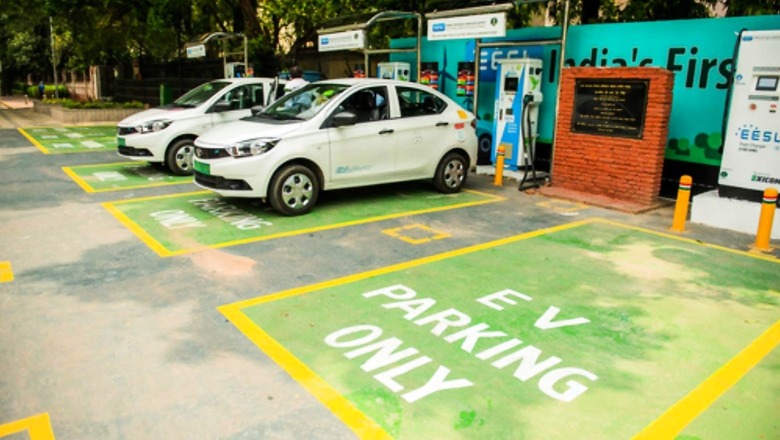
views
On the lines of the Production Linked Incentive (PLI) Scheme for Advanced Chemistry Cell (ACC) battery storage for electric vehicles (EV), the government should consider another PLI for battery components, feel industry experts
In a survey by ACKO and YouGov India, about 66% of Indians said that EVs will surpass petrol and diesel vehicles by 2030. Also, 57% of the consumers in the country want to invest in EVs because of their practical benefits, while 56% want to purchase an EV because of its eco-friendly characteristic.
However, 60% of the surveyed people also noted that the current infrastructure of India is not ideal to support EVs and believe that a drastic improvement is required.
Meanwhile, a report by NITI Aayog and Rocky Mountain Institute stated that India’s annual battery market could surpass $15 billion (Rs 1.12 trillion) by 2030, and the battery demand in India is expected to rise to 260 GWh in the accelerated scenario by the same year.
Batteries account for roughly 25-50% of EV costs. As costs fall and specific energy densities rise, performance and cost competitiveness of EVs would improve and they may soon become the more appealing choice for customers.
THE PLI SCHEME
Earlier this year, the government approved the PLI Scheme, ‘National Programme on Advanced Chemistry Cell (ACC) Battery Storage’, with a budgetary outlay of Rs 18,100 crore to achieve a manufacturing capacity of 50 GWh of ACC to enhance India’s manufacturing capabilities.
The government’s emphasis is to achieve greater domestic value addition while ensuring that the levelized cost of battery manufacturing in India is globally competitive.
In the coming years, the lithium-ion battery market will be driven by rising demand for electric vehicles and a shift toward clean energy sources. This increased demand will provide a significant boost to the EV and EV battery industries, as well as help generate a significant amount of employment in the country, say experts.
ANOTHER SCHEME
Regarding another PLI scheme for battery components, one of the industry experts, Rajat Verma, Founder and CEO, Lohum, told News18: “The critical component of a battery is the raw material that goes into making a cell. Currently, this activity is almost nonexistent in India and primarily takes place in China. If India wants to become competitive in cell and battery manufacturing, the battery raw material should be produced domestically, and a PLI scheme can enable that.”
Nitin Kapoor, Managing Director of Saera Electric Auto Private Limited, said a PLI scheme was needed to encourage the research on new technologies and innovations. He said: “Unlike the existing PLI scheme, the new scheme is not expected to have any minimum investment parameter to encourage startups and companies financially. It can promote manufacturing, export and storage of lithium-ion cells, the core components to develop EVs.”
He said it will accelerate the adoption of zero-emission vehicles and project India as a hub of EV manufacturing. “It will help reduce the dependency on a country like China for import of major EV components, making India an alternative hub for manufacturing of zero-emission e-vehicles,” Kapoor said.
Meanwhile, Akshay Singhal, CEO and Founder of Log9 Materials, said that a promising PLI initiative will also give the due impetus to the Atmanirbhar Bharat dream of India.
According to the industry insider: “Today, as we speak, over 80% of the batteries in India are imported from China making us vulnerable and dependent on them towards achieving our goals. What we need is a ground-up approach driven by cutting-edge research to develop cells and batteries bespoke for the tropical operating conditions and to further give it shape, a world-class manufacturing base.”
“The PLI scheme will not just ensure self-reliance in the country’s energy needs, but will also lead to technological competitiveness amongst domestic players, hence ensuring only the best reaches the final customers. However, it is equally important for the government to ensure that only tangible and viable business plans are supported under the PLI scheme. Unrealistic bids made only to qualify as the L1 (the first layer of submitting proposals when requesting PLI support) should be dealt with strictly,” he added.
Ankit Mittal, Co-founder and CEO of Sheru, told News18 that as the cell in the battery is the single most important component, the PLI scheme that is currently in place for ACC addresses a large part of the battery pack but to fully realise localised production of the battery, a PLI that covers the other components could help. “India’s auto industry worked towards localisation of components and this has helped in securing supplies, driving job creation as well as lowering costs. Similar cost reductions could be achieved through localised production of components for EVs.”
Read all the Latest Auto News here



















Comments
0 comment